NEWS
North Carolina African American Veterans’ Lineage Day Ceremony
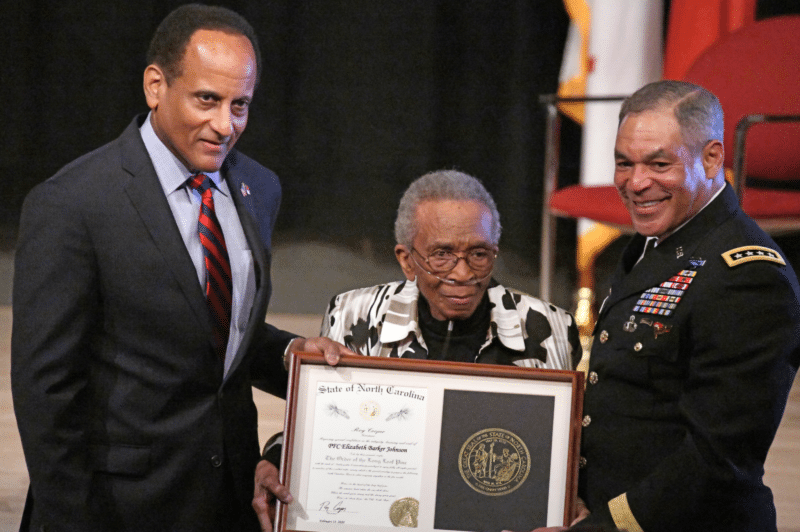
Mrs. Elizabeth Barker Johnson was awarded the Order of the Long Leaf Pine Secretary Larry D. Hall and General Michael X. Garrett at the 2nd Annual African American Veterans Lineage Day Ceremony.
[Note: the basis of this article was a press release from the NC Department of Military and Veterans – it was modified by News of Davidson to include more detail about the event and the veterans in attendance]
Please also look at our News of Davidson photo album from the ceremony.
RALEIGH, N.C.—It may have been a dreary, rainy day outside, but spirits were bright inside the N.C. Museum of History on Thursday, as veterans and public officials from across the state gathered to celebrate the 2nd Annual African American Veterans Lineage Day. For active duty service members, their families, students, veterans, and every day North Carolinians, the occasion was both a chance to celebrate the dedication of the state’s military community as well as learn about the important role black North Carolinians played in breaking color barriers in the service. The event was sponsored by the North Carolina Department of Military and Veterans Affairs (NCDVMA) in conjunction with the North Carolina Museum of History, Elizabeth City State University, and State Archives of North Carolina.
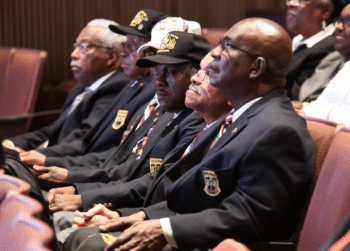
Veterans and guests in attendance at the North Carolina Museum of History
“We have a duty to preserve this history for future generations, so that sense of purpose and dedication is not lost on us as a state. These citizens have an important story to tell, and it matters just as much today as it did in those previous decades,” said North Carolina Department of Military and Veterans Affairs Secretary, Larry D. Hall.
Originally organized in 2019 by NCDMVA, African American Veteran Lineage Day was first conceived as an event to honor black service members who helped to break the color barrier in the Armed Forces. This year, an official proclamation by Governor Roy Cooper designated Feb. 13, 2020 as African American Veteran Lineage Day. The scope of the event was expanded to include a panel discussion with high ranking active duty and retired military officials, a history session hosted by the N.C. Museum of History, and a formal ceremony to honor black N.C. veterans who served when the military was still segregated or very newly integrated.
The day’s program began with two concurrent events: a panel discussion and a history session. The panel discussion which was held in the lobby of the museum featured Secretary Hall, Lieutenant General USMC (ret.) Walter Gaskin, General Michael Garrett Commanding General – U.S. Army Forces Command , Major General USA(ret.) Rodney Anderson, and Brigadier General USA (ret.) Arnold Gordon-Bray. The panelists provided remarks and answered audience questions. Individually and collectively they placed an emphasis on the importance of service. Much of what the veterans had to say centered on the fact that many of those being celebrated were willing to risk their lives in conflicts abroad at a time when they were denied many of the rights and freedoms at home.
“In the United States today, you can be anything you want to be – a general, a cabinet secretary, a business owner. All you need for success is vision, hard work and a little bit of luck,” said General Garrett. “That’s why I am grateful for those who came before me, so that I can have the career I have today.”
Listening intently to the assembled panel – ROTC cadets, NROTC midshipmen, and students from Elizabeth City State University, NC State, UNC Chapel Hill, NC Central University, Duke University, Shaw University and St. Augustine’s University heard about the value of integrity and hard work in the face of adversity. Significantly, the remarks were from those whose formative years were influenced strongly by the struggle for civil rights as well as military service.
“Integrity is the bedrock of our service,” said General Anderson. “The enemy doesn’t care about the color of your skin . . . we have to remember those who fought for the right for us to fight to defend rights,” added Lt. Gen. Gaskin.
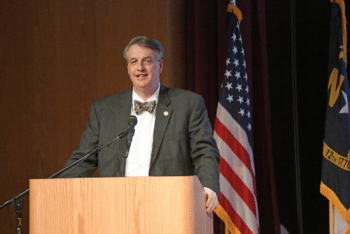
Dr. Kevin Cherry – Deputy Secretary of the North Carolina Department of Natural and Cultural Resources and Director of the Office of Archives and History
While the panel discussion was taking place, others gathered in the museum auditorium for a history lesson, putting in context the contributions of African American Veterans in the state of North Carolina. Earl Ijames, curator of African American and Agricultural History at the museum. Ijames was followed by Dr. Kevin Cherry – deputy secretary of the N.C. department of natural and cultural resources and director of the office of archives and history.
Cherry said, “today great day for this institution and the State of North Carolina as we join the Department of Military and Veterans Affairs in recognizing the selfless service of our African American veterans from World War II, Korea, Vietnam, Iraq, Afghanistan, and posthumously – the American Civil War.”
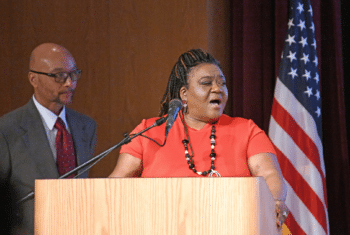
Ms. Mary Williams sang the “Battle Hymn of the Republic” during the history session. She also sang the “National Anthem” and “Lift Every Voice” at the awards ceremony.
The words of welcome were followed by a stirring rendition of “Battle Hymn of the Republic” sung by Mary Williams as members of the 35th United States Colored Troops Regiment marched to the stage and rendered honors to the flag.
Ijames then spent much of the remainder of the program talking about each of the North Carolina African American veterans that would be honored during the subsequent awards ceremony portion of the program.
The first historical overview was of 8 Montford Point Marines, the first black Marines who enlisted after President Roosevelt issued an Executive Order. These Marines trained at Camp Montford Point N.C. during WWII. The segregated training facility was located less than 20 miles from Paris Island. Members of the audience learned more about the lives leading up to and following these Marines training at Montford Point:
- Charlie Bowman of Marshville
- William Thomas Burton of Durham
- Francis Hooper Jr. of Laurinburg
- Allen Seth Johnson of Morrisville
- Clarence Garland Powell of Edgecombe County
- John Thompson of Kannapolis
- James B. Wilson of Wilmington
- Nimrod Woods of Yanceyville
Next, Ijames talked about Henry McKinley “Mickey” Michaud, former member of the North Carolina General Assembly. Michaud served in the U.S. Medical Corps from 1952-1954, and in the Army Reserves from 1954-60. He established a close friendship with Rev. Martin Luther King Jr. in his extensive Civil Rights work in North Carolina. Next, it was retired Major General Rodney O. Anderson, a South Carolina native who spent 33 years in the U.S. Army. After retiring in 2012 as the Deputy Commander, XVIII Airborne Corps, Anderson stayed in North Carolina. He currently serves as the CEO of LDR Consulting.
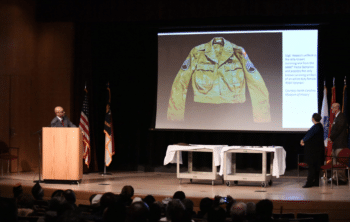
Mr. Ijames and other staff members from the North Carolina Museum of History show a jacket belonging to the late SSG Millie Dunn Veasey – who was a member of the Women’s Army Corps, all African American, all woman battalion in World War II. The original uniform jacket was on one of the carts on the stage.
The next veteran recognized was retired Brigadier General Arnold N. Gordon-Bray – who was recognized for his more than 3 decades of service in uniform. Ijames highlighted the work that Gordon-Bray did in mentoring a senior Iraqi army general officer.
The final general officer’s biography reviewed was that of retired U.S. Marine Corps Lieutenant General Walter E. Gaskin – who served as the Commanding General of the 2d Marine Division at Camp Lejeune, NC from June 2006 until July 2008. Subsequently, he served as the 19th Deputy Chairman of the NATO Military Committee.
Rep. Nasif Majeed (District 99) was recognized as a former U.S. Air Force pilot – a B-52 aircraft commander. He flew more than 120 combat missions during Vietnam, and following his military service he returned home to N.C. and flew for Piedmont Airlines.
Retired U.S. Army Colonel Fred Black, served on the faculty of West Point as an associate professor of Political Science and now holds a presidential appointment as a member of the Board of Visitors at West Point.
Joseph Holt Jr. was the first African American to apply to attend the all-white Josephus Daniels High School in Wake County, but was not allowed to attend. Holt went on to earn a commission in the U.S. Air Force and served 25 years – and accumulated more than 6,300 flying hours.
During an in depth historical overview of the Civil War era 1st North Carolina Colored Infantry was the first unit to allow formerly enslaved and free people of color. The unit was federalized as the 35th U. S. Colored Troops Regiment in 1864. Ijames suggested that the 35th was the first unit to have dog tags – or identification tags. The museum has one of these tags in its collection. The design on the front of the tag was used to create thenew medallion cast to honor N.C. African American Veterans.
It was then time to recognize the oldest veteran in the room – 99-year-young former Army Private Elizabeth Barker Johnson. She was born in Elkin, NC in 1920 and enlisted in the Women’s Army Corps during WWII after seeing a poster of Uncle Sam saying, “I Want You.” She was one of 855 African American women selected to deploy overseas. Members of the 6888 were initially stationed in England and subsequentlyFrance. Johnson served as a truck driver in the unit. After her discharge in Nov. 1945, she became the first woman to use the GI Bill to go to school – earning her Bachelors Degree in Teaching from then-Winston Salem State Teachers College.
Following the discussion of the 6888 Central Postal Delivery Battalion, curators brought out a one-of-a-kind artifact – the uniform of the late SSG Millie Veasey – another North Carolina native and member of the 6888.(Veasey died in 2018 at the age of 100.) Paige Myers, the museum’s textile conservator spoke about the challenges of preserving the military uniform. It is believed to be the only remaining uniform from an African American woman WWII veteran.
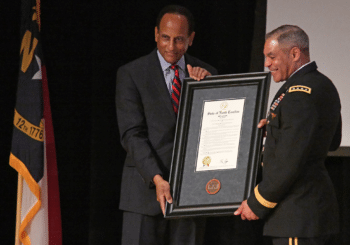
Secretary of Military and Veterans Affairs presented a framed copy of the Resolution designating Feb. 13 as African American Veteran Lineage Day to General Michael X. Garrett
The final part of the history session was an overview of the history work with North Carolina Veterans that is being done at Elizabeth City State University. Dr. Sharon Raynor – Dean, School of Humanities and Social Science. She showed the trailer of the documentary that is being produced about North Carolina’s African American Veterans. The documentary is entitled: The Veteran Chronicles: The Legacy and Service of African American Veterans.
Following a 5-minute intermission, the awards ceremony began at 1p.m. Assistant Secretary of Military and Veterans Affairs Ariel Aponte opened with words of thanks to the various groups that had made the event possible – including a long list of Veterans Service Organizations. Following the arrival of the official party, colors were presented by the combined UNC Chapel Hill ROTC/NROTC Color Guards. The National Anthem and the Negro National Anthem were performed acapella by Mary Williams. In what was particularly stirring, the crowd slowly – then more resolutely – joined her in singing “Lift Every Voice.”
Deborah Holt Noel, senior producer at UNC TV, then took over as the master of ceremonies. The event was personal for her – as one of the veterans being recognized was her father. Noel first introduced Secretary Larry Hall – highlighting his legislative and Marine Corps background.
Sec. Hall provided brief welcoming remarks – specifically calling out the importance of African American veteran lineage in the State of North Carolina. He reminded those gathered that we stand on the shoulders of those who came before us, and it is time to honor them.
Hall also highlighted that the DVMA has commissioned a medal to honor N.C. African American Veterans and the history of its development. He also read the Proclamation designating February 13 as African American Veteran Lineage Day.
In the introduction of the Keynote Speaker, Noel provided highlights from the biography of General Michael X. Garrett – the Commanding General of U.S. Army Forces Command at Fort Bragg.
In his brief remarks, Garrett noted that two of his former bosses were seated in the audience, a fact that put additional pressure on him. He then thanked the African American veterans in the room, and said that without their service he would not be standing there. He said that a gathering like this was like being in “rarified air.”
Following the keynote remarks, Sec. Hall presented Gen. Garrett with a framed copy of the African American Veteran Lineage Day Proclamation and the African American Lineage Medal of Distinction.
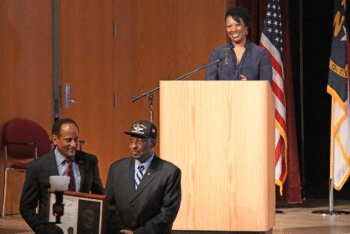
Secretary Larry Hall presents the Order of the Long Leaf Pine to retired Air Force LtCol Joseph H. Holt Jr. (Holt’s extremely proud daughter – Deborah Holt Noel – served as the emcee for the ceremony.)
Secretary Hall and Lt. Gen. Gaskin then presented The Old North State Award to the following Montford Point Marines: Charlie Bowman, James B. Wilson, Allen S. Johnson – posthumously, and Nimrod O. Woods –posthumously.
General Garrett then joined Secretary Hall for the presentation of the Order of the Long Leaf Pine to the following veterans: William T. Burton (Montford Point Marine), John R. Thompson (Montford Point Marine), Francis M. Hooper Jr. (Montford Point Marine), Private First Class Elizabeth Barker Johnson (6888 Central Postal Delivery Battalion), and LtCol Joseph H. Holt Jr. USAF(Ret).
Assistant Secretary Aponte then joined Secretary Hall for the presentation of the North Carolina Department of Military and Veterans Affairs African American Lineage Medal of Distinction. The medals were presented posthumously to the following: Ferdinand Vincent “Pete” Allison Jr., Allen S. Johnson, Private Luke Martin,SSG Millie Dunn Veasey, and Nimrod O. Woods. The medals were presented to the following living veterans: State Rep. Nasif Majeed, State Sen. Mickey Michaux, Congressman G.K. Butterfield (award received by Tanya Butterfield Smith), James B. Wilson, Charlie Bowman, Clarence Powell, LtGen(Ret) Walter Gaskin, MG(Ret)Rodney Anderson, BG(Ret) Gordon-Bray, COL(Ret) Fred Black, former General Assembly Sergeant-at-Arms Toussaint Avent, William T. Burton, John. R. Thompson, Francis M. Hooper Jr., PFC Elizabeth Barker Johnson, and LtCol(Ret) Joseph H. Holt Jr.
Members of the NC Buffalo Soldiers motorcycle club – who honor the original Buffalo Soldiers – the all-black 9th and 10th Army Cavalry regiments established by Congress after the Civil War were also in attendance.
Following the close of the official program, many of the guests joined Secretary Hall and NCDMVA staff for a meet and greet. Sec. Hall said the Department is looking forward to holding the event every February. “We want this to be a tradition, because these individuals have impacted the current generation, and they have a story that really does need to be told. The State of North Carolina is proud of them; we are proud to call them our own.”
African American Veteran Lineage day is, if nothing else, a day to celebrate the struggle to overcome adversity, and the idea that just one person can inspire others to rise to the occasion, whether that be through civic service or military duty. “No matter where you are in life, you have to focus on those things that help make you successful,” said Gen. Gordon-Bray. “You have to fight through the obstacles you can anticipate, you also have to assume success.”
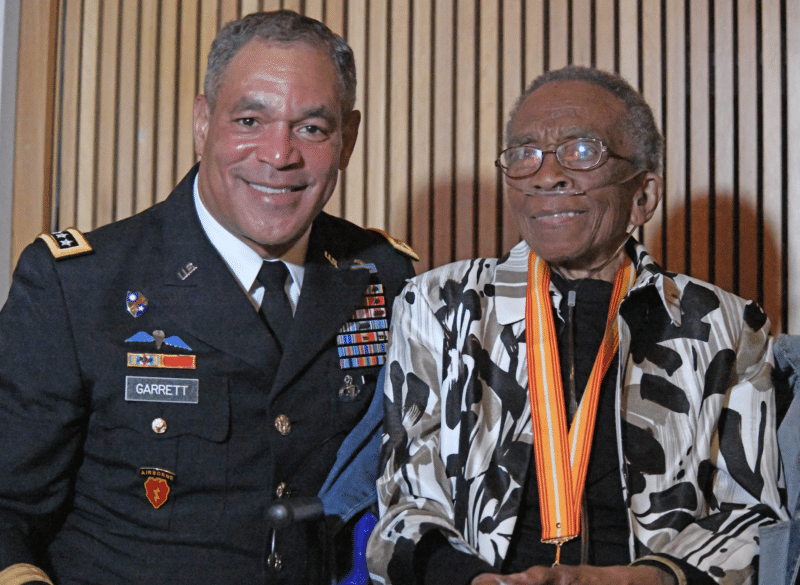
Following the ceremony, GEN Garrett came over to talk with Mrs. Elizabeth Barker Johsnon – who served overseas during WWII with the 6888 Central Postal Delivery Battalion in the Women’s Army Corps.


